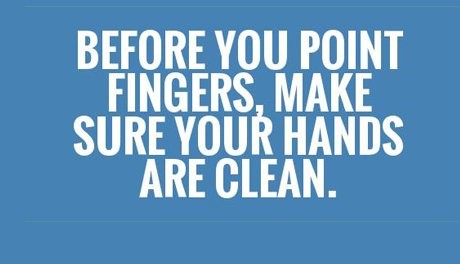
“Accountability is not just a mind-set—it’s also a skill-set that everyone can learn.”
The Benefits Of Personal Accountability
For many people it can be tough to be responsible and take personal accountability. In reality being accountable may not be easy but it surely provides some potentially amazing benefits such as healthier relationships with friends, family and colleagues. Professionally, being accountable builds trust and relatedness with others as well as within teams. Leaders who are accountable are more likely to be trusted and respected, because people know that they will keep their word. I like to call this simply having integrity.
People who take responsibility for their actions speak up, and they look for solutions when there’s a problem. They don’t get into the blame game or begin finger pointing.
“Personal accountability isn’t a trait that people are born with, it’s a way of living that you can learn.”
Below are 6 tips you can take on now to start building your own accountability muscle.
1) Know Your Role
It’s almost impossible to be personally accountable if you’re not clear what you’re responsible for. If this is the case for you, ask your boss or someone else to provide some clarity as to what you are being asked to do. This applies to both friends as well as colleagues. If responsibilities are unclear within the team, ask your manager to outline who is responsible for different team tasks, and to share this information with everyone involve.
Takeaway: Do not be afraid to ask questions. It’s better to not waste time and spin your wheels if you don’t have to. In the end you will look more foolish for wasting your time as well as others.
2) Be Humble
Success in life usually comes when you’re completely honest with yourself and with others. This means setting aside your pride, and admitting when you’ve made a mistake.
Takeaway: Honesty is always the best policy, but don’t use it to blame others, or to make excuses. Instead, focus on your own role in a situation, and think about how you can resolve the problem.
3) Own Your Mistakes
Accountability doesn’t stop with personal humility and honesty. If something has gone wrong and you were responsible, then you need to step up and right the wrong. Some say there is a difference between “apologizing” and saying “I am sorry” but I personally believe the overall sentiment is the same. You are acknowledging the current situation and your piece or part in it.
Takeaway: Focus on making amends and building bridges, not erecting walls. Express a level of sincerity that shows the other individual that you’ll do what it takes to make the situation right. This allows everyone involved to move on, and helps them focus on the end goal, rather than the problem.
4) Manage Your Time
I realize time management is a concept and skill unto itself but regardless of your level of mastery with it, procrastination is a common (and easy) way to avoid responsibility, as it delays dealing with a problem. This ultimately means that someone else may be burdened with it and have to solve it instead. Your friends and colleagues may feel that they can’t rely on you, and this will affect your professional reputation and more importantly your character.
Takeaway: The way people perceive you is critical in all aspects of your life. Procrastination is something you can overcome by identifying the triggers such as the task at hand, are you lacking information needed to get the job done or do you simply not understand what’s being asked of you (see tip #1).
5) Don’t Over Commit
Fact: When you take on too much, something will eventually fall through the cracks. That means that you’ve let someone or some group down. Before you say yes to the next role, task or assignment, think carefully about your schedule and whether you’ll be able to fulfill on what’s being asked of you and whether you will be able to accomplish it to the best of your ability.
Takeaway: Saying “no” or “not now” can help you create personal and professional boundaries which can aid you in your overall time management skills. If you are not sure you can complete the task that is being asked of you, don’t be afraid to first ask questions (see tip #1) to ensure you can properly evaluate how long it will take and whether you can fit it into your existing priorities.
6) Ask For Feedback
Accountability can open up powerful learning opportunities but only if you unlock the door. Whether you overcommit, take on something without asking questions or mismanage your time – when something hasn’t gone to plan, asking for feedback can provide you the key opportunities to learn and ensure you don’t have a repeat performance.
Takeaway: Each day/night – take a moment to look back on what you were asked to do and what you actually accomplished. Think about if you were successful and if you weren’t, ask yourself what could you have done differently that may have resulted in a faster, smoother or easier outcome.
Summary
When you’re personally accountable, you take ownership of situations that you’re involved in. You see them through, and you take responsibility for what happens – good or bad. You don’t blame others if things go wrong. Instead, you do your best to make things right. In time, you’ll build new skills and better ways to deal with difficult situations and people and as a result keep your integrity, perception and overall performance and happiness in check.